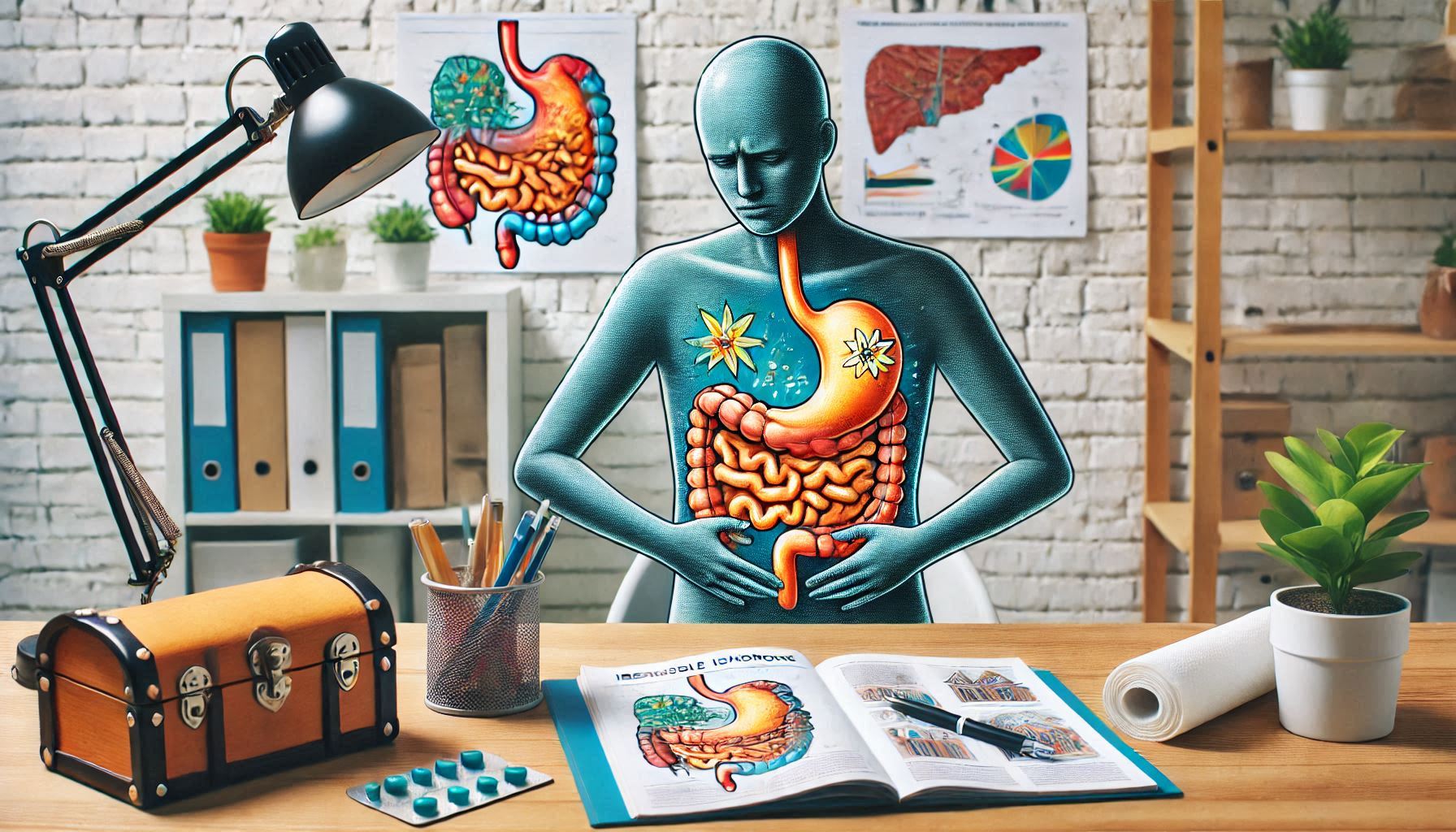Mastering IBS Pain Management: Understanding, Preventing, and Relieving Discomfort Author: ItHurts.com A Comprehensive Talk on Mastering IBS Pain Management Understanding the Basics: Living with Irritable Bowel Syndrome (IBS) can be a challenging and often isolating experience. Characterized by abdominal pain and altered bowel habits, IBS affects millions worldwide. Managing the pain associated with IBS requires understanding its causes, physiological underpinnings, and effective strategies for prevention and relief. In this article, we’ll delve deep into IBS pain, exploring its description, causes, physiological basis, presentation, treatment options, and actionable prevention strategies. Description of IBS Pain IBS pain is often localized in the abdomen but varies widely in presentation, including: Cramping Pain: Commonly described as spasmodic or twisting, this pain often worsens after meals and improves after bowel movements. Sharp, Stabbing Pain: Sudden and intense, this type can appear during IBS flare-ups and may feel incapacitating. Dull, Persistent Ache: Some individuals report a constant, nagging discomfort in the abdomen, especially during periods of stress or poor diet. Bloating-Related Discomfort: This pain stems from gas build-up, causing a feeling of tightness or heaviness in the stomach. The intensity ranges from mild discomfort to severe pain that interferes with daily life, and it can occur anywhere in the lower abdomen, though the exact location may shift over time. Causes of IBS Pain IBS pain arises from several factors, including: Altered Gut Motility: Irregular intestinal contractions can lead to cramping and bloating. Visceral Hypersensitivity: People with IBS often have a heightened sensitivity to pain signals from the digestive tract. Gut-Brain Axis Dysregulation: Stress and anxiety can exacerbate IBS symptoms by disrupting communication between the brain and gut. Dietary Triggers: Foods high in fat, caffeine, or fermentable carbohydrates (FODMAPs) often worsen symptoms. Microbiome Imbalance: An overgrowth or imbalance of gut bacteria can contribute to IBS-related pain. Underlying Reasons for IBS Pain The physiological and anatomical basis for IBS pain lies in several interconnected factors: Muscle Strain in the Gut Wall: Intestinal muscles contract abnormally, leading to painful spasms. Nerve Sensitivity: Heightened nerve responses amplify the sensation of pain, even to normal digestive processes. Inflammation: Although IBS isn’t traditionally considered an inflammatory condition, subtle inflammation may play a role in pain exacerbation. Gut Microbiota Disruption: Imbalances in beneficial and harmful gut bacteria can produce excess gas and irritate the gut lining. These factors combine to create the hallmark abdominal pain of IBS, often worsened by psychological stress or poor dietary habits. Presentation of IBS Pain IBS pain can manifest differently in individuals but typically involves: Timing: Pain often peaks after meals and improves after bowel movements. Bowel Habit Changes: Accompanying diarrhea, constipation, or alternating patterns. Trigger Sensitivity: Pain increases with the consumption of trigger foods or during stressful situations. Localization: Pain is usually in the lower abdomen but may shift throughout the gastrointestinal tract. These presentations can fluctuate over time, making IBS a highly individualized condition. Treatment and Relief for IBS Pain a. Dietary Adjustments Adopt a Low-FODMAP Diet: Avoid foods like onions, garlic, beans, and high-fructose fruits. Stay Hydrated: Drink at least 8 glasses of water daily to ease constipation. Monitor Triggers: Maintain a food diary to identify personal trigger foods. b. Stress Management Techniques Mindfulness and Meditation: Techniques like yoga and deep breathing help reduce stress-related symptoms. Cognitive Behavioral Therapy (CBT): Effective in addressing anxiety linked to IBS. c. Physical Relief Gentle Exercises: Activities like walking or stretching can aid digestion and relieve bloating. Abdominal Massage: Use circular motions to reduce cramping. Heat Therapy: Applying a warm compress to the abdomen can soothe pain. d. Medical Interventions Antispasmodics: Medications like dicyclomine help reduce muscle spasms. Probiotics: Improve gut microbiome balance to alleviate symptoms. Fiber Supplements: Psyllium husk can ease constipation, but avoid insoluble fibers if symptoms worsen. Prescription Treatments: For severe cases, medications like rifaximin or eluxadoline may be prescribed. Emerging Research: What’s Next for IBS? Exciting developments in IBS research are giving doctors hope for better treatments in the future. These include: Targeted Microbiome Therapies: Precision probiotics or microbiome modulation therapies. Gut-Brain Neuromodulation: Devices that regulate nerve activity in the gut. Biomarkers for Diagnosis: Blood or stool tests to identify IBS more accurately. Doctors believe that continued advancements will make IBS management more effective and individualized. Actionable Steps for Preventing IBS Pain To minimize the risk of IBS flare-ups: a. Dietary Strategies Plan meals with balanced nutrients and avoid large, heavy meals. Gradually increase fiber intake to avoid bloating. Limit caffeine, alcohol, and processed foods. b. Stress Management Practice daily relaxation techniques such as progressive muscle relaxation. Incorporate regular physical activity like swimming or cycling. Seek professional counseling or join support groups if IBS affects mental well-being. c. Maintain a Healthy Gut Include fermented foods like yogurt and kefir in your diet. Avoid unnecessary antibiotic use to protect beneficial gut bacteria. d. Ergonomic and Lifestyle Adjustments Avoid tight clothing that constricts the abdomen. Stick to a consistent meal schedule to support digestive regularity. Prioritize sleep, as poor sleep can exacerbate symptoms. Final Thoughts: IBS pain is multifaceted, with causes rooted in gut sensitivity, dysregulated motility, and psychosocial factors. By combining dietary changes, stress management, and medical interventions, individuals can effectively manage and prevent IBS pain. Scientific research reinforces the value of a holistic approach, emphasizing the interplay between diet, mental health, and gut microbiota. Proactively adopting these strategies can empower individuals to regain control over their symptoms and lead a more comfortable, fulfilling life. Remember, small daily changes can yield significant improvements in IBS management. Take action today: Start a food diary, try a mindfulness practice, or consult a healthcare provider for a personalized management plan. Your journey to pain relief begins now! Footnotes Camilleri, M. (2022). “Visceral Pain in IBS.” Nature Reviews Gastroenterology & Hepatology. Staudacher, H.M., et al. (2017). “Efficacy of Low-FODMAP Diet in IBS.” Gastroenterology. Ford, A.C., et al. (2014). “Probiotics for IBS Treatment.” The American Journal of Gastroenterology. ItHurts.com is your ally in your endeavor to live pain-free. We offer guidance, resources, and community support to address chronic pain, emotional
What Your Doctor Wishes You Knew About IBS: Breaking the Myths and Empowering Your Health Author: ItHurts.com A Comprehensive Talk on IBS Pain Management Understanding the Basics: Irritable Bowel Syndrome (IBS) is a condition that affects millions of people worldwide, yet it remains one of the most misunderstood and stigmatized gastrointestinal disorders. Many individuals suffer silently, unsure of what’s happening in their bodies, often navigating a maze of conflicting information. Doctors treating IBS patients frequently encounter misconceptions that hinder proper diagnosis and management. Let’s uncover what healthcare professionals wish people understood about IBS and how this knowledge can lead to better health outcomes. Understanding IBS: What Is It, Really? Doctors emphasize that IBS is a functional gastrointestinal disorder. This means it affects how the gut works, not necessarily its structure. Unlike conditions such as Crohn’s disease or ulcerative colitis, IBS doesn’t cause visible inflammation or damage to the digestive tract. Instead, it manifests through symptoms like abdominal pain, bloating, diarrhea, constipation, or a mix of both. A key point many doctors stress is that IBS is a legitimate medical condition. Despite the lack of visible abnormalities in medical tests, the symptoms are real and can severely impact a person’s quality of life. Myths About IBS That Doctors Want to Burst “IBS Is All in Your Head” One of the most frustrating misconceptions for both patients and doctors is the belief that IBS is a psychological issue. While stress can exacerbate symptoms, IBS is a complex interplay of the brain-gut connection, diet, and gut microbiota. “IBS Is Just a Fancy Term for Food Intolerance” While some people with IBS have food triggers, it is not synonymous with food allergies or intolerances. Doctors wish people knew IBS is a multifactorial condition, not just a reaction to certain foods. “There’s No Hope for Treating IBS” Many patients feel helpless after being diagnosed, assuming there’s no effective treatment. However, doctors highlight that a combination of lifestyle changes, dietary adjustments, stress management, and sometimes medication can significantly reduce symptoms. The Role of the Brain-Gut Connection One of the most fascinating aspects of IBS is its link to the brain-gut axis. This connection explains why stress, anxiety, and even depression can worsen symptoms. Doctors stress that addressing mental health is a crucial part of managing IBS. Therapies like Cognitive Behavioral Therapy (CBT) or gut-directed hypnotherapy have shown promise in reducing symptoms by calming the nervous system and improving the gut’s response to stress. Understanding this connection helps patients view IBS as a condition requiring a holistic treatment approach. Diet and IBS: More Than Just FODMAPs The low-FODMAP diet often comes up as a key dietary intervention for IBS. FODMAPs are a group of fermentable carbohydrates that can trigger symptoms in sensitive individuals. While many find relief with this diet, doctors caution against blindly eliminating foods without guidance. Healthcare providers recommend working with a dietitian to ensure the diet is balanced and sustainable. Additionally, not everyone benefits from a low-FODMAP approach, as IBS triggers vary widely between individuals. The Gut Microbiome and IBS Doctors are increasingly pointing to the gut microbiome—the trillions of bacteria living in the digestive tract—as a significant player in IBS. Disruptions in the microbiome (dysbiosis) may contribute to IBS symptoms. Probiotics, prebiotics, and even fecal transplants are being explored as potential treatments. However, doctors advise caution with over-the-counter probiotics, as not all are created equal. Choosing a strain-specific probiotic tailored to IBS symptoms (like Bifidobacterium infantis for bloating) can make a difference. Medications: A Piece of the Puzzle There’s no one-size-fits-all medication for IBS, but various options exist to target specific symptoms. Doctors often explain these options to patients: Antispasmodics for abdominal pain Laxatives or antidiarrheals for bowel irregularities Rifaximin, a targeted antibiotic, for small intestinal bacterial overgrowth (SIBO)-related symptoms Low-dose antidepressants for pain modulation Doctors stress that medications are just one part of the treatment plan and should be used alongside dietary and lifestyle interventions. Doctors’ Biggest Frustration: The Diagnostic Delay On average, it takes four years for a person to receive an IBS diagnosis. This delay often happens because people dismiss symptoms or mistake them for occasional digestive upset. Additionally, IBS symptoms overlap with other conditions like celiac disease, inflammatory bowel disease (IBD), or even endometriosis, making diagnosis challenging. Doctors encourage patients to seek help early, especially if symptoms persist or worsen. A timely diagnosis not only provides clarity but also prevents unnecessary suffering. IBS Triggers: It’s Not Just About Food Food often takes the blame for IBS flare-ups, but doctors emphasize that triggers extend beyond diet. Some common non-dietary triggers include: Stress and Anxiety: Emotional turmoil can directly impact gut motility and sensitivity. Hormonal Fluctuations: Many women report worsening symptoms around their menstrual cycle. Medications: Antibiotics, NSAIDs, and even supplements can exacerbate symptoms. Sleep Patterns: Poor sleep quality is linked to more severe IBS symptoms. Identifying personal triggers through journaling or working with a healthcare provider can help patients manage flare-ups more effectively. What Doctors Wish Patients Knew About Self-Management Doctors advocate for a proactive approach to managing IBS. While there’s no cure, patients can gain significant control over their symptoms. Some tips doctors frequently share include: Listen to Your Body: Pay attention to patterns in symptoms and potential triggers. Don’t Fear Food: Restrictive diets can lead to nutrient deficiencies and disordered eating. Balance is key. Practice Stress Management: Techniques like mindfulness, yoga, or therapy can have profound effects on IBS symptoms. Stay Open to Experimentation: IBS is not a one-size-fits-all condition. Finding what works may require patience and flexibility. The Importance of Empathy in IBS Care Many doctors recognize the emotional toll IBS takes on their patients. Living with a chronic, unpredictable condition can lead to feelings of isolation, embarrassment, and anxiety. Doctors encourage patients to communicate openly about how IBS affects their daily lives, as this can guide more personalized and effective treatment plans. Moreover, they want patients to know they’re not alone. Support groups, both in-person and online, can provide a sense of community and shared


